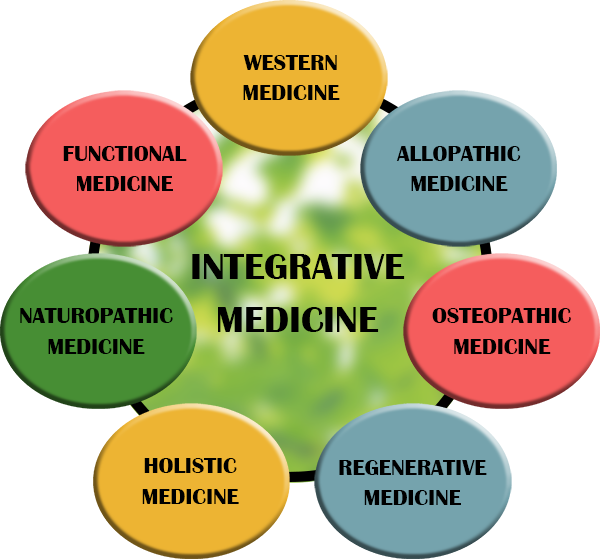Discover How Functional Medicine Restores Balance and Promotes Optimal Wellbeing
Introducing the Recovery Methods of Functional Medicine and Holistic Medicine for Ideal Wellness
The exploration of functional and holistic medicine reveals unique yet linked paths to health and wellness (Functional Medicine). Functional medicine seeks to discover the underlying root causes of disorders, while holistic medicine accepts a larger perspective of wellness that includes spiritual and emotional measurements. With each other, these approaches present a structure for individuals to organize their health and wellness journeys. This conversation will highlight the principles, practices, and differences between these methods, welcoming more factor to consider of their combined potential
Recognizing Functional Medicine: Principles and Practices
Functional medicine represents a standard shift in medical care, emphasizing a patient-centered approach that seeks to deal with the origin and recognize source of ailment. This version incorporates scientific research study with clinical experience, viewing patients as distinct people as opposed to mere signs of an illness. Specialists of practical medicine utilize a systems biology perspective, exploring the interactions between genetic, environmental, and way of living variables that add to wellness results.
Trick concepts consist of tailored therapy plans tailored to the individual's certain needs, cultivating a collective relationship between person and practitioner. Functional medicine also prioritizes preventive treatment, concentrating on lifestyle adjustments, nourishment, and anxiety administration to support general wellness. This strategy encourages clients to take an energetic duty in their health and wellness, leading to enhanced end results and a much deeper understanding of their problems. Eventually, functional medicine intends to bring back balance and advertise wellness, transforming the medical care experience into among empowerment and holistic healing.

The Holistic Medicine Technique: Integrating Mind, Body, and Spirit
While numerous health care approaches concentrate exclusively on physical symptoms, all natural medicine stresses the interconnectedness of mind, body, and spirit in the search of excellent health and wellbeing. This integrative method identifies that psychological and psychological factors substantially affect physical wellness, leading professionals to ponder the entire person during treatment. All natural medicine employs diverse techniques, including meditation, nourishment, and way of life modifications, to promote equilibrium and harmony within the person.
Specialists typically engage people in conversations regarding their moods, partnerships, and life experiences, acknowledging that these elements can affect total wellness. By resolving advertising and underlying problems self-awareness, holistic medicine aims to equip people in their recovery trip. Holistic Medicine. This paradigm change urges a positive strategy to health, supporting for safety nets and way of living modifications as opposed to simply dealing with signs. Eventually, all natural medicine seeks to cultivate a much deeper link in between spirit, mind, and body, assisting in extensive wellbeing and personal development

Key Differences Between Functional and Holistic Medicine
Although both functional and holistic medicine prioritize comprehensive client care, they vary markedly in their methodologies and philosophies. Functional medicine stresses a systems-oriented strategy, concentrating on identifying and treating the underlying root causes of diseases. Professionals commonly utilize innovative diagnostic screening and customized therapy plans, which might include way of living adjustments, medicines, and supplements to bring back equilibrium within the body's systems.
On the other hand, holistic medicine adopts a wider perspective, considering the emotional, spiritual, and environmental aspects affecting an individual's wellness. It looks for to promote general health and wellbeing through a mix of alternative treatments, such as acupuncture, yoga exercise, and meditation, along with conventional therapies.

Typical Problems Treated by Functional and Holistic Medicine
Lots of individuals look for both functional and holistic medicine for a range of typical wellness problems. These techniques are commonly used to attend to chronic ailments such as diabetes mellitus, high blood pressure, and autoimmune disorders (Learn More). Functional medicine concentrates on identifying underlying causes through comprehensive assessments, while holistic medicine stresses the interconnectedness of the body, mind, and spirit
Psychological health and wellness issues, consisting of anxiety and clinical depression, are also regularly dealt with within these structures, as they consider psychological and emotional elements along with physical signs. Furthermore, digestive system disorders like cranky digestive tract syndrome (IBS) and food sensitivities are common issues, with both methods supporting for important source dietary adjustments and lifestyle adjustments.
People might additionally turn to these modalities for problems such as persistent fatigue disorder and fibromyalgia, where standard treatments might fall short. By incorporating different healing techniques, practical and all natural medicine objective to cultivate overall well-being and improve quality of life for those impacted.
How to Choose the Right Approach for Your Health And Wellness Journey
Exactly how does one identify one of the most appropriate wellness method amidst the myriad of options offered? The choice in between all natural and useful medicine needs mindful factor to consider of individual requirements and preferences. Originally, one need to assess their health and wellness goals, whether they look for signs and symptom relief or a deeper understanding of underlying issues. Next, reviewing one's medical history and present problems can provide clarity on which technique might be most helpful.
Consultation with healthcare experts experienced in both fields can supply valuable understandings. Understanding the principles of each technique-- useful medicine's focus on organic systems and holistic medicine's emphasis overall person-- can help in making an enlightened option. Furthermore, thinking about individual values and comfort with treatment modalities, such as dietary modifications or alternative therapies, is important. Eventually, a tailored technique that lines up with one's way of life and beliefs will foster an extra efficient health trip.
Often Asked Questions
Are Functional and Holistic Medicine Covered by Insurance Plans?
Insurance insurance coverage for holistic and functional medicine varies significantly by plan and copyright - Learn More. Some insurer might provide partial compensation, while others do not cover these alternate techniques whatsoever, needing out-of-pocket repayments from clients
How Lengthy Does Therapy Commonly Absorb These Strategies?
Treatment duration in all natural and useful medicine differs widely, typically varying from a couple of weeks to several months. Elements influencing this consist of specific health problems, therapy plans, and the client's dedication to way of life adjustments.
Can I Combine Functional and Holistic Medicine With Conventional Therapies?
Yes, individuals can combine practical and all natural medicine with standard therapies. This integrative strategy might boost general health and wellness, but consulting healthcare suppliers is vital to ensure security and performance in managing therapy plans.
What Qualifications Should Professionals of These Approaches Have?
Professionals of practical and all natural medicine should have pertinent degrees in medicine or wellness sciences, together with specialized training in their corresponding fields - Learn More. Qualifications from recognized organizations enhance trustworthiness and assurance adherence to developed requirements of treatment
Exist Details Diet Regimens Advised in Functional or Holistic Medicine?

In all natural and functional medicine, particular diets frequently include entire foods, plant-based options, and elimination diets customized to private requirements. Emphasis lies on nutrient density and avoiding refined foods to improve general health and wellness.
Functional medicine seeks to reveal the underlying reasons of conditions, while holistic medicine welcomes a broader point of view of wellness that includes spiritual and psychological dimensions. While functional medicine is more scientifically oriented, stressing biological processes, all natural medicine stresses the interconnectedness of different life elements. Numerous patients look for both practical and alternative medicine for a range of usual wellness conditions. Understanding the concepts of each method-- useful medicine's emphasis on organic systems and all natural medicine's focus on the whole individual-- can help in making an informed choice. Practitioners of holistic and functional medicine should have pertinent degrees in medicine or health and wellness sciences, together with specialized training in their respective fields.